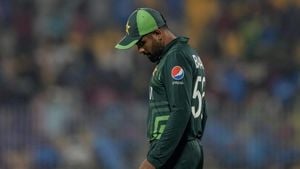Clashes erupted at the Al-Aqsa Mosque Compound this past week, igniting already heightened tensions between Israeli police and Palestinian worshippers. The troubles began on October 7, amid significant religious observances, leading to violent confrontations over several days.
The Al-Aqsa Mosque, located within East Jerusalem, is one of Islam’s holiest sites. This historic location has been at the center of disputes for decades, particularly as tensions ebb and flow around various religious observances. During this week’s clashes, Israeli police were stationed heavily at the compound, prompting serious confrontations with worshippers.
“The situation has escalated quickly, and we are witnessing unprecedented violence at one of Islam's holiest sites,” remarked Mohammad Sarhan, as reported by Al Jazeera. This sentiment reflects the frustration felt by many who frequent the mosque, particularly during significant religious periods.
The violence was marked by police using tear gas and rubber bullets against demonstrators, who reportedly responded by throwing stones. The chaotic scenes played out as thousands of worshippers gathered to mark important days of prayer. Witnesses described scenes of panic and horror as the clashes escalated, and the streets surrounding the mosque quickly became battlegrounds.
Ruth Cohen, reflecting on the events for The Times of Israel, stated, “This is not just about one event; this is about years of tension arching over the status of this area.” Policymakers on both sides have recognized the delicate balance needed to maintain order at the site, yet recent incidents indicate how easily this balance can tip.
Reports indicate over 200 individuals were injured during these confrontations, compounding existing humanitarian concerns surrounding the region. The general public is left grappling not only with the physical injuries but also with the emotional toll of such violence at sacred sites.
The events at Al-Aqsa bring to light the broader issues influencing Israeli-Palestinian relations, namely, the unresolved status of Jerusalem and the political maneuvers surrounding it. Many Palestinians view actions taken by Israel at the site as provocations, deepening existing feelings of resentment and anger.
These clashes are not isolated; they are reminders of long-standing grievances fueled by both religious fervor and political ideology. Experts warn this kind of unrest may threaten the fragile status quo, especially as both sides brace for more demonstrations as religious holidays approach.
The aftermath of this week’s violent confrontations leaves questions about how to move forward. What measures can be taken to de-escalate rising tensions? Who bears the ultimate responsibility for safeguarding worshippers at one of Islam’s most revered places? If not addressed, the consequences could echo throughout the already complex socio-political fabric of the region.
With the international community watching closely, the hope remains for dialogue and mutual respect among all parties involved. Yet, the recent violence serves as a grim reminder of the distance still to be traveled toward peace.



